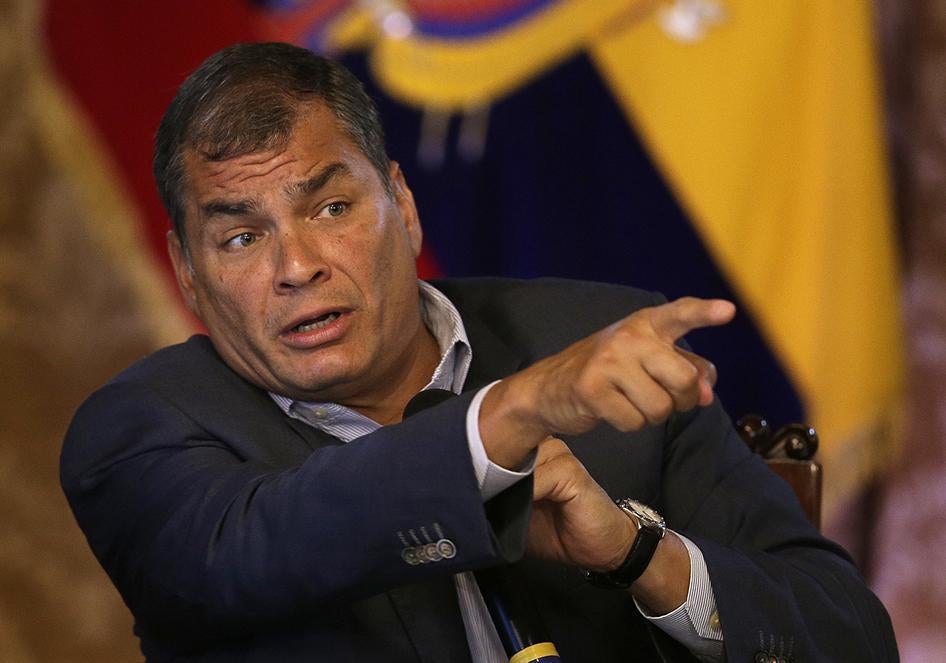There’s no doubt that President Rafael Correa considers independent media outlets to be his enemies. To get a sense of how far his government has gone, here are some tragicomic examples showing remarkable levels of authoritarianism.
Three years ago, Correa signed the Communications Law, which gives the government broad powers to limit free speech. The law requires all information disseminated by media to be “verified” and “precise.” Those criteria are every bit as vague as they appear, and they have opened the floodgates to censorship. The law also prohibits “media lynching,” defined as “repeatedly disseminating information with the purpose of discrediting or damaging the reputation of a person or entity.” This provision is music to the ears of those who want to hide corrupt practices, conflicts of interest, and abuses of power. And in an Orwellian, doublethink twist, the law prohibits “censorship,” which would be good news if it were not used for punishing the failure of independent media to cover issues that the government considers to be of “public interest.”
The body responsible for implementing the law, called SUPERCOM, has used it to stifle independent media outlets.
For example, despite—or perhaps because of—the precision of a cartoon captioned “Police and the Attorney General’s Office search the home of Fernando Villavicencio and take away documentation of corruption allegations,” SUPERCOM fined El Universo, the newspaper that published it, US$ 90,000 in January 2014. SUPERCOM ruled that depicting, in cartoon form, the raid on the home of a journalist and union member who had exposed a government corruption scandal “delegitimized” the government’s actions and risked causing “social agitation.” It also found that the cartoon’s caption provoked “mistrust of the investigative and criminal justice system.”
A month later, the cartoonist had to publish a “rectified” cartoon. He showed smiling and friendly agents asking Villavicencio for permission to enter his home and offering to call his lawyer and make a list of all the documents they intended to confiscate. The “rectified” cartoon portrayed Villavicencio declining those generous offers, saying he trusts the authorities.
Ecuadorean media have to watch not only what they say, but also what they don’t say. In June 2014, after Correa complained during his weekly TV show that Ecuadorean papers had failed to adequately cover a recent official visit he made to Chile, SUPERCOM opened an investigation against four newspapers—El Universo, El Comercio, Hoy, and La Hora—because coverage of Correa’s trip failed to mention an honorary doctorate that a Chilean university had bestowed on the president. The case remains open.
Furthermore, complaining about censorship carries its own risks. When the Ecuadorean Association of Newspaper Editors ran a paid ad in Expreso complaining about the muzzling effect of the Communications Law, SUPERCOM opened an investigation into the newspaper, and in September 2015, it ruled that the ad was not precise enough. It ordered the paper to publish a “rectification” and pay for it out of its own pocket.
SUPERCOM has repeatedly imposed fines on media that refuse to publish corrections using the exact terms ordered by the Communications Ministry.
But SUPERCOM has failed to sanction government media in analogous cases. When Correa called the president of Quito’s Chamber of Commerce a “fascist” on his weekly Ecuador TV show, and the president of the Chamber brought a case against the station, SUPERCOM ruled that Correa’s show was not subject to the Communications Law because it constituted a “permanent accountability mechanism” of the president.
In this depressing context, a few weeks ago four independent Ecuadorean journalists launched a humorous project that allows Ecuadoreans to make Correa criticize his own government. On a website called MashiMachine, users can type in a sentence and the program splices clips from the president’s TV show together to produce the sentence out of Correa’s voice and images. Let’s see how long the president and his SUPERCOM tolerate Correa’s irreverent comments.









